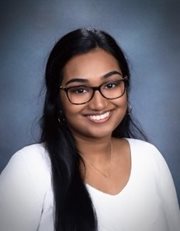Niharika Putta

Niharika was born in India and witnessing her family's experiences with healthcare challenges in rural areas initially sparked her interest in global health, tropical medicine and healthcare accessibility. Niharika is currently a second-year medical student at the UMass Chan Medical School. Prior to pursuing her MD, she graduated from Brandeis University with a degree in Biology and Health Science, Society and Policy. This interdisciplinary curriculum provided her with the unique opportunity to learn more about global health and public health from multiple perspectives, furthering her interest in these fields. During her first year of medical school, Niharika was accepted into the Population, Community and Global Health Pathway, which has also significantly contributed to her knowledge and desire to continue integrating global health into her career. She also volunteers as a Case Manager at one of Worcester's Free Clinics to help connect patients to local resources, worked with local mobile clinics and is a scribe for the UMass Chan Asylum Clinic. In her free time, Niharika enjoys traveling, trying out new recipes and finding new hiking spots.

Evaluating the Impact of a Community Health Worker-Centered Chronic Disease Screening and Management Program (SPARSH) in Rural India
Bhaikaka University
India
What does the Kean Fellowship mean to you?
I am deeply honored to be a recipient of the 2024 Benjamin Kean Fellowship. This fellowship has provided me with the incredible opportunity to spend time in India during medical school, allowing me to gain vital firsthand experience in global health fieldwork. This experience also allows me to connect with the local rural communities in Gujarat, India, and build valuable relationships with other healthcare professionals who are deeply passionate about global health.
What do you anticipate learning?
Spending time in rural India this past summer was a transformative experience, providing me with valuable insights into the practical implementation of community-based healthcare initiatives in resource-limited settings. I had the opportunity to work with SPARSH, a community health worker-led program implemented by Shree Krishna Hospital, a program that is deeply rooted in the community. This experience allowed me to gain a deeper understanding of the importance of engaging with and learning from the communities we serve.
Despite facing operational challenges, witnessing innovative solutions to overcome barriers and deliver accessible healthcare was incredibly valuable. Moving forward with this project, I look forward to continuing the quantitative analysis of the SPARSH program. I aim to learn more about the impact of SPARSH on the local community over the past decade and explore how similar community health worker-led programs can be scaled effectively.
What interests you about tropical medicine and what problems are you interested in solving?
I am deeply fascinated by tropical medicine because it directly addresses the health challenges faced by vulnerable populations, where infectious diseases and chronic conditions often intersect in complex ways. The field's focus on diseases prevalent in tropical and subtropical regions aligns with my passion for global health and health equity. I am particularly interested in addressing issues related to healthcare access and disease prevention in rural and underserved communities. This includes improving early detection and treatment of diseases like malaria, dengue, neglected tropical diseases, as well as chronic non-communicable diseases. Additionally, I am eager to develop and evaluate community-based health interventions, such as chronic disease screening programs, that empower local health workers and improve overall health outcomes. I hope to work toward bridging gaps between academic research and practical, on-the-ground solutions, which is crucial for making a tangible impact on the health and well-being of these populations.